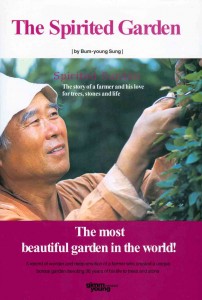 Sung Bum-Young founded ‘The Spirited Garden’ on Korea’s Jeju island, in 1968. The garden is a world-renowned bonsai venue, and is in Jeju’s Top Ten attractions. You simply can’t miss seeing it when you’re there.
Sung Bum-Young founded ‘The Spirited Garden’ on Korea’s Jeju island, in 1968. The garden is a world-renowned bonsai venue, and is in Jeju’s Top Ten attractions. You simply can’t miss seeing it when you’re there.
What every visitor yearns to discover is how this garden was built. This book, The Spirited Garden: The Story of a Farmer and his Love for Trees, Stones, and Life (2005, ISBN 89-349-1966-3) explains it, and the story gets more astonishing with every page. Sung bought the property on a dream. It was a volcanic wasteland, and everyone, it seemed, thought he was a lunatic. The property, full of rocks and scree, simply was not garden material. And Sung did it pretty much on his own, with a small group of volunteers, then employees. He dug out rocks without the benefit of machinery, cleared the land, and severely injured his back in doing so. His wife nearly left him, his creditors tried to put the property up for auction, you name it. But he finally opened his garden in 1992, and it’s been successful ever since.
There’s a lot to think about in this 315 page book. Bonsai fans will find plenty of information on planting, trimming, and watering. But the real power in this book is the compelling evidence that if one has a dream and sticks with it, he or she can make it happen. Sung Bum-Young encountered hurdles that frankly, would have discouraged most people. Trying to build his dream wasn’t fun, for him or his family. But now the garden is thriving, and is one of Korea’s most interesting spots.
And Sung’s dream evolves. He envisions a museum, and much of it is already built, on the other side of a wall most visitors don’t see. He loves watching people enjoying the garden, and often sits drinking tea in a small indoor room adjacent to a table where this book is sold.
The book is highly recommended on several levels: human perseverance, creating an art experience, and a metaphor for the struggles of Korea are just three that come to mind. But no one reading this book can ever come away without thinking of something that was attempted in one’s past, and was left unfulfilled. As readers, we celebrate Sung’s triumphs; as humans, they belong to all of us who have dreamed.
Leave a Reply